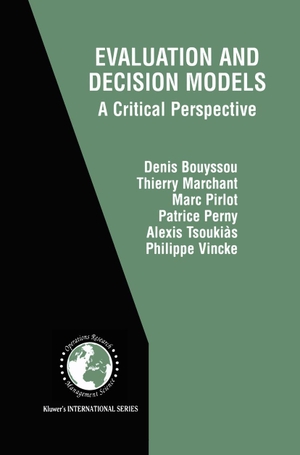Für statistische Zwecke und um bestmögliche Funktionalität zu bieten, speichert diese Website Cookies auf Ihrem Gerät. Das Speichern von Cookies kann in den Browser-Einstellungen deaktiviert werden. Wenn Sie die Website weiter nutzen, stimmen Sie der Verwendung von Cookies zu.
Cookie akzeptieren
Denis Bouyssou / Thierry Marchant / P. Vincke / Patrice Perny / Alexis Tsoukias / Marc Pirlot
Evaluation and Decision Models
- Springer US
- 2000
- Gebunden
- 292 Seiten
- ISBN 9780792372509
1. 1 Motivations Deciding is a very complex and difficult task. Some people even argue that our ability to make decisions in complex situations is the main feature that distinguishes us from animals (it is also common to say that laughing is the main difference). Nevertheless, when the task is too complex or the interests at stake are too important, it quite often happens that we do not know or we are not sure what to decide and, in many instances, we resort to a decision support technique: an informal one-we toss a coin, we ask an oracle, we visit an astrologer, we consult an expert,
Mehr
Weniger
zzgl. Versand
in Kürze